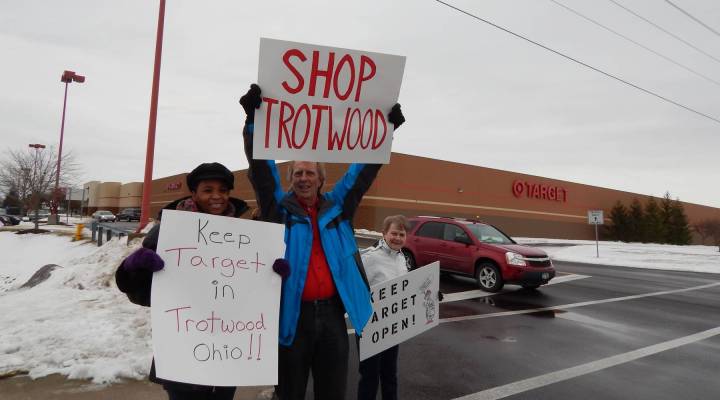
Ghostboxes: What’s left behind when Target shuts its doors?
Ghostboxes: What’s left behind when Target shuts its doors?

Big-box retailers have hit on hard times lately — Best Buy, Sears, and Kmart have all closed hundreds of stores since 2011. Online competition and a changing suburban landscape are among the challenges, but it turns out shuttering big-boxes has some unanticipated consequences. Eight Target stores are set to close across the country on May 3, which has caused an uproar in one Ohio town.
Since January, residents of the middle-class suburb in Trotwood, Ohio, have been up in arms over Target’s announcement that it will close a store there. On a dreary Saturday morning, protesters stream into the store’s parking lot, but they’re not marching or chaining themselves to the doors. It’s a “shop-in.” These protesters are rolling out those red Target carts and buying stuff, from crock pots to toothpaste to underwear.
The shop-in was organized by Trotwood residents as a last-ditch effort to show Target they have buying power. But Target shows no signs it will change its plans to close eight stores around the country, including the one here.
“It was like, ‘What? Target?!'” says Trotwood’s mayor, Joyce Cameron. “It was devastating.”
Adding insult to injury, Mayor Cameron says Trotwood’s leadership heard about the closure from the newspaper, not from the Target corporation.
One of the biggest problems Trotwood faces is population loss: more than 10 percent of the population has left in the last decade. The poverty rate here has shot up, too, from 6 percent in 1989 to 18 percent in 2011. Now big-boxes are bleeding out of this middle-class suburb, taking jobs and property taxes with them.
“Sears, Penney’s, Lazarus, Wal-Mart, Kmart, we’ve slowly, one by one watched them leave,” says Trotwood City Council member Bruce Kettelle. “There’s a shift going on and we’re part of that shift. Unfortunately, we have to live with it. But we don’t want to live with it.”
As to what exactly that shift is, it depends who you ask. Target wouldn’t give an interview, but it issued a statement saying closures are generally due to a store’s weak long-term financial performance.
Plenty of experts will say closures don’t necessarily signal an overall decline for a chain or an industry.
“Brick and mortar stores, in other words, physical stores, are not going to go away,” says Serdar Durmusoglu, a retail expert at the University of Dayton. “There’s movement from one suburb to the other.
“Target in particular is still opening more stores than it’s closing—reorganizing, but not reducing, its big footprint.
What’s going on in Trotwood, though, is more about a trend towards boarded-up big-box stores. There’s even a name for them: “ghostboxes.”
Sarah Schindler, a law professor at the University of Maine, has researched the legal implications of ghostboxes for municipalities. She says ghostboxes are expensive to demolish, and it’s difficult to turn these buildings into something else. In her opinion, that points to poor planning decisions.
“I think a lot of communities are coming around to the realization that this sort of big-box, single-use commercial district wasn’t necessarily the best idea,” Schindler says.
“Other than just to shutter the doors and get out of town, there really needs to be a better exit strategy,” says Mike Lucking, the Trotwood city manager. He says if towns are going to bring in big-box stores, they need to think ahead about what happens when the companies move out.
Lucking remembers when Trotwood was the shiny new shopping destination outside Dayton: “Things really do go full circle.”
Without Target and all the other big-boxes that closed, Trotwood won’t be much of a destination at all.
Getting out of his car at last Saturday’s shop-in, Doyle Copeland says it will now be a 20-minute drive to the next discount retailer
“It’s the last thing we got, we need this Target,” Copeland says.
There’s a lot happening in the world. Through it all, Marketplace is here for you.
You rely on Marketplace to break down the world’s events and tell you how it affects you in a fact-based, approachable way. We rely on your financial support to keep making that possible.
Your donation today powers the independent journalism that you rely on. For just $5/month, you can help sustain Marketplace so we can keep reporting on the things that matter to you.


















